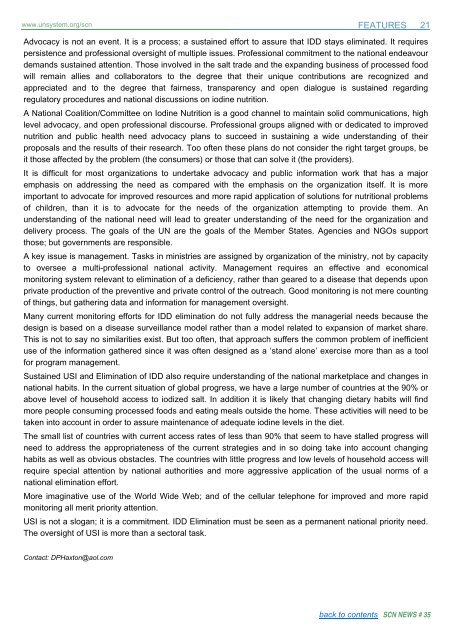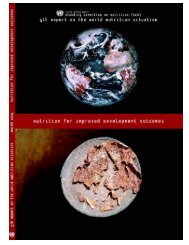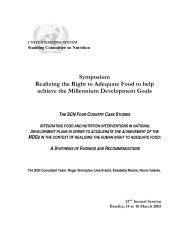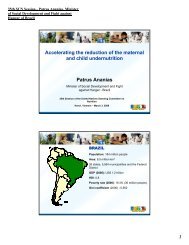Universal Salt Iodization (USI) - FTP Directory Listing
Universal Salt Iodization (USI) - FTP Directory Listing
Universal Salt Iodization (USI) - FTP Directory Listing
- No tags were found...
Create successful ePaper yourself
Turn your PDF publications into a flip-book with our unique Google optimized e-Paper software.
www.unsystem.org/scn FEATURES 21Advocacy is not an event. It is a process; a sustained effort to assure that IDD stays eliminated. It requirespersistence and professional oversight of multiple issues. Professional commitment to the national endeavourdemands sustained attention. Those involved in the salt trade and the expanding business of processed foodwill remain allies and collaborators to the degree that their unique contributions are recognized andappreciated and to the degree that fairness, transparency and open dialogue is sustained regardingregulatory procedures and national discussions on iodine nutrition.A National Coalition/Committee on Iodine Nutrition is a good channel to maintain solid communications, highlevel advocacy, and open professional discourse. Professional groups aligned with or dedicated to improvednutrition and public health need advocacy plans to succeed in sustaining a wide understanding of theirproposals and the results of their research. Too often these plans do not consider the right target groups, beit those affected by the problem (the consumers) or those that can solve it (the providers).It is difficult for most organizations to undertake advocacy and public information work that has a majoremphasis on addressing the need as compared with the emphasis on the organization itself. It is moreimportant to advocate for improved resources and more rapid application of solutions for nutritional problemsof children, than it is to advocate for the needs of the organization attempting to provide them. Anunderstanding of the national need will lead to greater understanding of the need for the organization anddelivery process. The goals of the UN are the goals of the Member States. Agencies and NGOs supportthose; but governments are responsible.A key issue is management. Tasks in ministries are assigned by organization of the ministry, not by capacityto oversee a multi-professional national activity. Management requires an effective and economicalmonitoring system relevant to elimination of a deficiency, rather than geared to a disease that depends uponprivate production of the preventive and private control of the outreach. Good monitoring is not mere countingof things, but gathering data and information for management oversight.Many current monitoring efforts for IDD elimination do not fully address the managerial needs because thedesign is based on a disease surveillance model rather than a model related to expansion of market share.This is not to say no similarities exist. But too often, that approach suffers the common problem of inefficientuse of the information gathered since it was often designed as a ‘stand alone’ exercise more than as a toolfor program management.Sustained <strong>USI</strong> and Elimination of IDD also require understanding of the national marketplace and changes innational habits. In the current situation of global progress, we have a large number of countries at the 90% orabove level of household access to iodized salt. In addition it is likely that changing dietary habits will findmore people consuming processed foods and eating meals outside the home. These activities will need to betaken into account in order to assure maintenance of adequate iodine levels in the diet.The small list of countries with current access rates of less than 90% that seem to have stalled progress willneed to address the appropriateness of the current strategies and in so doing take into account changinghabits as well as obvious obstacles. The countries with little progress and low levels of household access willrequire special attention by national authorities and more aggressive application of the usual norms of anational elimination effort.More imaginative use of the World Wide Web; and of the cellular telephone for improved and more rapidmonitoring all merit priority attention.<strong>USI</strong> is not a slogan; it is a commitment. IDD Elimination must be seen as a permanent national priority need.The oversight of <strong>USI</strong> is more than a sectoral task.Contact: DPHaxton@aol.comback to contents SCN NEWS # 35







